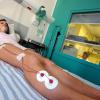A team from Nottingham looks at intraoperative molecular diagnosis of brain tumours using nanopore sequencing.

Brain tumours are the leading cause of cancer death in those under 40 years old. They can be challenging to diagnose pathologically, often needing complex molecular testing that can mean a wait of weeks for patients. Using nanopore sequencing, we have developed an ultrafast nanopore-based diagnostic pipeline that cuts that wait to a couple of hours, meaning the diagnosis is available before the operation is over. As laboratory scientists and pathologists, the technology has the potential to allow us to do our job – of predicting the future for our patients – all the more quickly and accurately and so inform treatment from the very beginning – when knife hits brain.
Click here to read the full article.
Image credit | Science photo library | iStock



